Marley Blu-ray Movie
HomeMarley Blu-ray Movie 
Magnolia Pictures | 2012 | 145 min | Rated PG-13 | Aug 07, 2012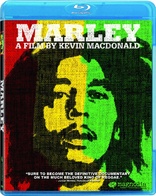
Movie rating
7.7 | / 10 |
Blu-ray rating
| Users | 4.8 | |
| Reviewer | 4.0 | |
| Overall | 4.3 |
Overview
Marley (2012)
A documentary on the life, music, and legacy of Bob Marley.
Starring: Bob Marley (I), Ziggy Marley, Jimmy Cliff, Rita Marley, Cedella MarleyDirector: Kevin Macdonald
| Music | Uncertain |
| Documentary | Uncertain |
| Biography | Uncertain |
Specifications
Video
Video codec: MPEG-4 AVC
Video resolution: 1080p
Aspect ratio: 1.78:1
Original aspect ratio: 1.85:1
Audio
English: DTS-HD Master Audio 5.1
Subtitles
English SDH, Spanish
Discs
50GB Blu-ray Disc
Single disc (1 BD)
Playback
Region A (C untested)
Review
Rating summary
| Movie | 4.0 | |
| Video | 4.0 | |
| Audio | 4.5 | |
| Extras | 3.5 | |
| Overall | 4.0 |
Marley Blu-ray Movie Review
Hits you with music.
Reviewed by Casey Broadwater August 6, 2012Bob Marley might be the only third-world musical superstar—born into Jamaican poverty and raised in the Trench Town slums, he eventually became an internationally lauded reggae artist, Rastafarian, and ambassador for peace. It's an unlikely life trajectory, and though it's been sketched out in biographies and TV specials before, it's never been as exhaustively and entertainingly covered as it is in Marley, a new two-and-a-half hour documentary by Kevin MacDonald, the director of Touching the Void, The Last King of Scotland, and One Day in September. Made with the blessing of the Marley family, the film does have the saintly glow of a hagiography at times—it glosses over the handsome singer's womanizing, for example, and paints him as something of a cultural savior—but otherwise, MacDonald's portrait is moving and dimensional, revealing the inspirations for the music and highlighting Marley's importance as a unifying figure in Jamaican politics. What's most impressive here is the sheer amount of fascinating archival material MacDonald has dredged up—concert footage, interviews, home movies—some of it never before seen.
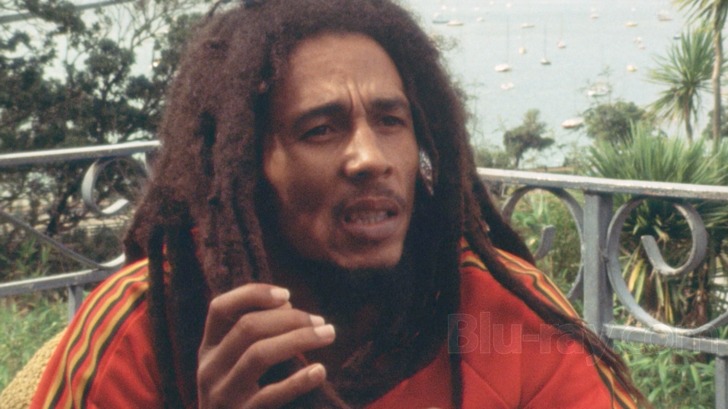
The film begins not in Jamaica, but in Ghana, where a guide gives us a tour of a fortress where captured Africans were funneled through the "Door of No Return" and onto awaiting slave ships bound for the New World. It's a potent open, echoing the Afro-centric themes of oppression and captivity and the fight for freedom found in Marley's music. But there's also the tension of contradiction here, as Marley's himself was half white, the son of "Captain" Norval Marley, a sixtysomething British forester—most likely a private, not a real captain—who impregnated a sixteen-year-old Jamaican girl and promptly split. For most of his young life, Marley was teased for his mixed-race parentage.
Born in a tin-roofed shack in the tiny village of Nine Mile—some of his relatives still live there—Marley and his mother moved when he was twelve to Kingston's rough Trench Town district, where he and his step-brother, Bunny Wailer, met Peter Tosh and formed a group called The Wailers, initially playing covers of American soul and doo-wop songs. The band faced a hiatus when Marley temporarily moved to Delaware in 1966—his mother decided to emigrate—but when he returned, it didn't take long for The Wailers to develop their signature sound. In a few broad but vivid strokes, the film explains the progression of Jamaican music, from traditional Mento and Calypso folk bands to ska and rocksteady, and eventually to the Rasta and African-influenced reggae, with its polyrhythms, off-beat skank accents, and distinctive chicka-chicka guitar tone. During this time, Marley came under the mentorship of Rastafarian priest Mortimer Planno, ditched his clean-cut boy-band look, and grew out his iconic dreads.
Moving chronologically, the film's middle section takes us through the band's many ups and downs, and features interviews with several of Marley's collaborators, friends, and business partners, including Chris Blackwell, the founder of Island Records. Blackwell signed The Wailers when they moved to London, and gave them the funds to record what's usually regarded as their best album, Catch a Fire. After a few tours that increased the band's visibility but didn't make them much money, Bunny Wailer and Peter Tosh left the group to pursue solo careers—it's also hinted that they were wary of being exploited by Blackwell—and Marley continued on with a new line-up, playing sold-out shows across the U.S. He was baffled by how predominantly white his concert audiences were, and disappointed that he never gained a sizable black following in America.
Back in Jamaica, violence between rival political groups held the nation is a state of tension. After agreeing to play the free "Smile Jamaica" concert— organized by Prime Minister Michael Manley, a democratic socialist—Marley, his wife Rita, and his manager were shot at home by a thug from an opposing party. Injured but not out of commission, Marley risked his life by playing at the concert two days later, then went into a self-imposed exile in London for his own safety. Two years later, he returned at the PM's request to play another peace concert, where he famously called Manley and his rival Edward Seaga onstage and had them join hands. The message of Marley's music came full circle when he embarked on a tour of Africa, denouncing South African apartheid and performing in Zimbabwe on the day of the country's independence from British rule.
Alongside the historical details, the film presents a compelling and mostly flattering picture of Marley the man, shy but enthusiastic, driven by racial and economic adversity to succeed. The most poignant moment is when we learn that Marley's song "Cornerstone" was inspired by a time when he was rejected by his white relatives, who owned one of Jamaica's largest construction companies. The line "the stone that the builder refuse will always be the head cornerstone"—a quote from the Bible—now takes on a new personal resonance. The fact that Marley had eleven children with seven different women is only lightly touched upon; his wife, apparently, was fine with this, eventually considering herself more of a "guardian angel," shooing over- adoring groupies out her husband's dressing room. Ziggy Marley, himself now a reggae star, says that his father was "tough, tough, tough," and his sister Cedella remembers their dad as as highly competitive.
Tragically, Marley's competitive spirit was also his undoing. When doctors discovered a patch of melanoma on his big toe and advised amputation, Marley refused, fearing it would affect his ability to play soccer, his favorite pastime. Three years later, after he collapsed while jogging in Central Park— he had played a sold-out show at Madison Square Garden the night before—doctors discovered that the cancer had spread throughout his entire body. He moved to Bavaria to undergo a radical treatment plan, but by this time, it was too late. There are few thing sadder than the description of how his heavy dreads—basically, his identity—had to be sheared off once the chemo caused them to fall out in patches. He died in Miami at only thirty six years old, but Marley reinforces what we already know—he's immortalized in his music, which continues to challenge and inspire.
Marley Blu-ray Movie, Video Quality 
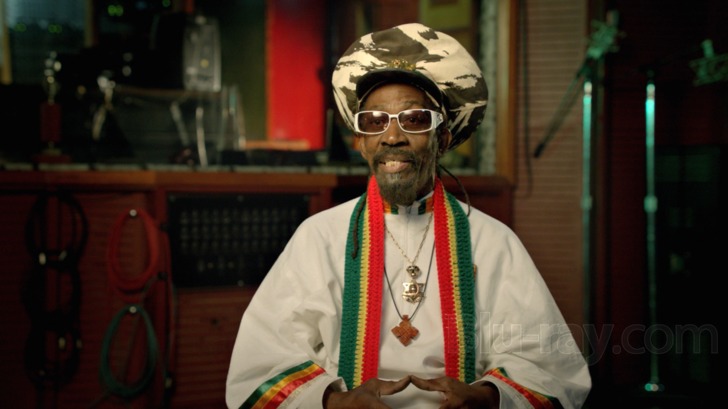
One thing that's impressive about Marley, from a visual standpoint, is that wherever possible, McDonald has gone back to the source of archival footage to transfer the original negatives in high definition. Granted, not all of the material is HD—actually, I'd say most of it isn't—but the clips that are look fantastic, often with a surprising degree of clarity. (Check out the footage from Haile Selassie's arrival in Jamaica, for instance.) Of course, the clips in standard def exhibit most of the usual shortcomings—macroblocking and artifacts, ghosting and aliasing, smeary black and white VHS dupes —but I'm guessing there's not much that could be done there. It is what it is, and you quickly get used to it. The contemporary interviews have all been shot on HD video, and these are generally sharp and clean, with good facial detail and realistic color. One of the early interviews with a relative in Nine Mile is uncharacteristically noisy and soft, which makes me suspect it was shot with a less professional rig, but the others have no real compression or source-related issues. The film's 1080p/AVC encode is more than satisfying, and easily trumps DVD, on-demand, or streaming options.
Marley Blu-ray Movie, Audio Quality 
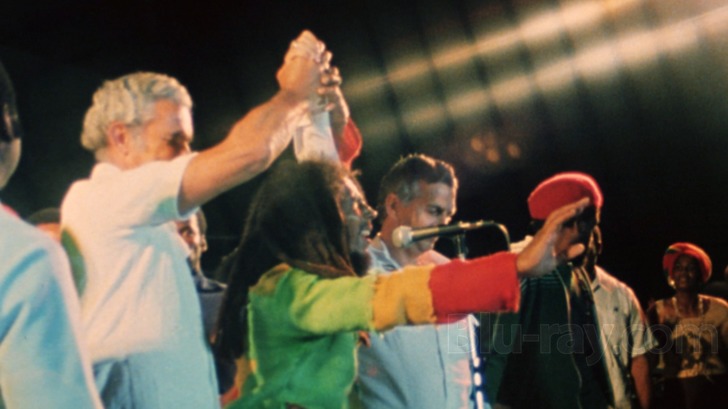
Magnolia Home Entertainment delivers Marley with a lossless DTS-HD Master Audio 5.1 surround track that's superb. The film is all about the music, naturally, and you'll hear excerpts from a score or more of Marley's songs, from his first-ever single, "Judge Not," to the acoustic "Redemption Song," the closing number on his final studio album. The hits sound as full and clean here as they ever have, and maybe even a bit better—the multi- channel mix allows the songs to be more immersive than I've ever heard them before. Snare hits are crisp, the chicka-chicka guitar sounds are cutting, and Marley's wailing is loud and clear. What I didn't necessarily expect was how the rear channels are used effectively for quiet natural ambience, filling out many of the interview sequences with the distant tweets of birds and the buzzes of insects. As you'd hope, the subjects' voices are always cleanly and clearly recorded, with no hisses, crackles, or peaking. Some of the vintage material is a bit grungier audio-wise, but never distracting or brash or unlistenable. An all-around great audio presentation. For that that need or want them, the disc includes optional English SDH and Spanish subtitles.
Marley Blu-ray Movie, Special Features and Extras 
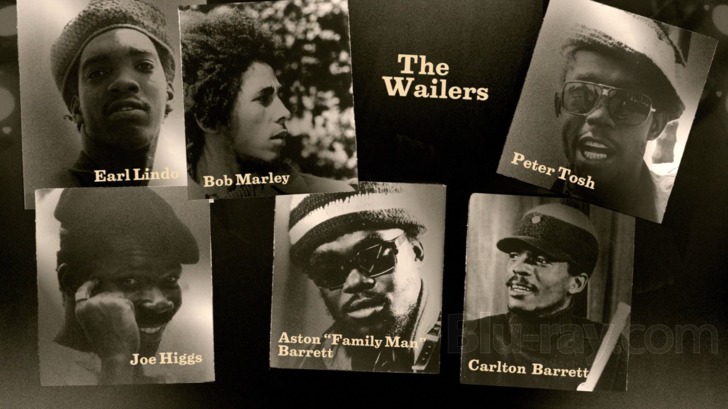
- Commentary with Director Kevin MacDonald and David "Ziggy" Marley: MacDonald discusses the process of making the documentary —from the securing of musical rights to the Marley-related surprises they learned along the way—and Ziggy chimes in occasionally with his own remarks.
- Around the World (1080p, 18:36): A great piece that explores Marley's continuing impact across the globe, from singing contests in Jamaica and cover bands in Zimbabwe to Marley-centric shops in Tokyo.
- Extended Interview with Bunny Wailer (1080p, 19:03): Twenty more minutes with Wailer, who explains the complicated blood ties between his and Marley's families, Bob's training as a welder with Desmond Dekker, and the importance of smoking ganja (as he blazes up a pipe made from a carrot).
- Children's Memories (1080p, 10:03): Additional interviews with David "Ziggy" Marley, Stephen Marley, and Cedella Marley, reflecting on their father, his music, and their childhoods.
- Listening to "I'm Loose" (1080p, 3:38): Some of the interview subjects listen to an off-the-cuff recording session that features Marley at his most unguarded.
- Photo Gallery (1080p): A self-guided gallery with photos and descriptive captions.
- Theatrical Trailer (1080p, 1:56)
- SiriusXM: Ziggy Marley's Legends of Reggae (Audio-Only, 2:07): A clip of Ziggy speaking with Jimmy Cliff this past February.
- Marley Soundtrack (SD, 00:23): A TV spot for the film's soundtrack.
- Visit Jamaica (SD, 00:47): A short promo for Jamaican tourism.
- Also from Magnolia Home Entertainment (1080p, 11:34)
Marley Blu-ray Movie, Overall Score and Recommendation 
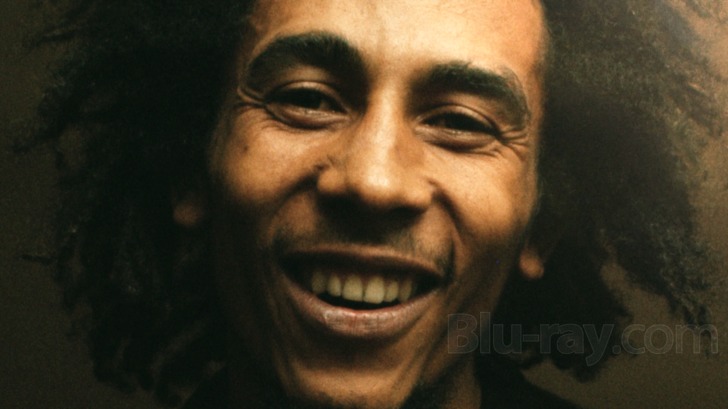
A comprehensive birth-to-death account of a short life well-lived, Kevin MacDonald's Marley grounds the reggae superstar in historical reality while simultaneously increasing the scope of the legend that surrounds him. Like Marley's music—which is heard here throughout—the film covers all the emotional bases; it's rebellious and nostalgic, impassioned and celebratory and sad. You don't have to be a Bob Marley fan to enjoy it, but if you are, you're in for quite an experience. The film was released in theaters and on-demand at the same time, but the Blu-ray really is the optimum way to watch Marley; the picture and sound are great, but it's the cornucopia of extras that really makes this disc worth a purchase. Highly recommended!
Similar titles
Similar titles you might also like

Linda Ronstadt: The Sound of My Voice
2019

Amy
2015

Mystify: Michael Hutchence
2019

Whitney
2018

Pavarotti
2019

Searching for Sugar Man
2012

The Stone Roses: Made of Stone
2013

Muscle Shoals
2013

No Direction Home: Bob Dylan
Deluxe 10th Anniversary Edition
2005

Queen Rock Montreal & Live Aid
1981

Springsteen & I
Bruce Springsteen
2013

Sinatra: All or Nothing at All
2015

History of The Eagles Parts 1 & 2
2013

Chuck Berry Hail! Hail! Rock 'n' Roll
1987

Michael Jackson's This Is It
2009

20 Feet from Stardom
2013

Oasis: Supersonic
2016

Concert for George
2003

The Rolling Stones: Crossfire Hurricane
2012

Miles Ahead
2015
